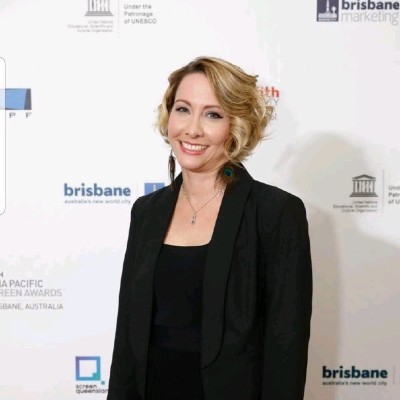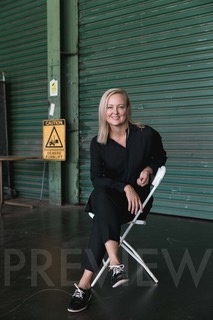2020 was supposed to be the 14th year of the annual Asia Pacific Screen Awards with a ceremony taking place on the Gold Coast. Recognising the filmmaking achievements of more than 70 countries, these awards have become an increasingly important event for our region, but the difficulties of 2020 have meant they’re been pushed back until next year.
But the good news is that the Asia Pacific Screen Academy is still going ahead with the 2nd Asia Pacific Screen Forum, which will take place from 20 – 26 November. First held last year in Brisbane in the lead up to the 2019 Awards, this year’s six-day forum will be free and uniquely accessible, with in-person events at the Home of the Arts (HOTA) on the Gold Coast, combined with a largely online program of talks, intimate round table discussions and some select screenings.
The forum boasts participating industry talent from eighteen countries. International participants include the Palme d’Or winning director Zeynep Atakan (Wintersleep, Turkey); producer Lee Joon-Dong and screenwriter Oh Jung Mi (Burning, People’s Republic of Korea); and a masterclass from leading Indian female film composer Sneha Khanwalkar (Oye Lucky! Lucky Oye!). Australian panelists include Madman’s Paul Wiegard, UPI Australasia’s Mike Baard, director Robert Connolly and Bunya producer Greer Simpkin.
Issues of diversity and inclusion have always been at the heart of APSA’s very reason for existence, but this year’s forum makes those concerns central. For example, there’s a panel on Asia Pacific Indigenous filmmaking, with participants Tusi Tamsese (Samoa/NZ), Cliff Curtis (Maori/NZ) and Christopher Kaunahana (Hawaii, USA). There’s another one on pathways forward for diverse filmmaking, with WIFT’s Katrina Irawati Graham and Ana Tiwary, together with Bus Stop Films’ Genevieve Clay-Smith, NZ producer Craig Gainsborough (Rūrangi), and Australia’s former Race Discrimination Commissioner, Tim Soutphommasane.
Many of us within the Australian screen industry are shamefully vague about APSA and our close filmmaking neighbours. But according to Jaclyn McLendon, Executive Director at the Asia Pacific Screen Awards, and Tracey Vieira, Chairperson of APSA, this is changing and many collaborations are developing quite outside of official co-productions.
Read: Screen News in Brief: Breaking the ice, Victoria back in business
We caught up with McLendon and Vieira by email to find out more about their roles there and the shape of this year’s forum, which is one of the first screen conferences to resume after COVID. They answered some questions individually, and some as a team.
Screenhub: How long have you each been involved with APSA, and what are the main strands of your role there?
Jaclyn McLendon: I’ve been with APSA since 2013, starting initially in production, event integration and then in 2017 taking the helm as APSA Lead. This involved overseeing all aspects of APSA from competition and ceremony, to audience development, industry engagement and academy involvement.

Image: Jaclyn McLendon, supplied.
Tracey Vieira: I’ve had a number of un-official roles with APSA prior to being Chair. Before the awards were established, I had conversations with Des Power AM who was the Chair of Queensland Events at the time and was working towards establishing this event. We met at the airport in Los Angeles and discussed his vision. He later became the inaugural Chair. Many years later I was on a trip back to Brisbane in 2013 and attended the Awards and I wrote to the organisers about my experience and where I thought the growth opportunities were. In 2014 I was offered the role of CEO of Screen Queensland and SQ came on Board as sponsors and started to work with APSA on industry programming which has essentially evolved into the Forum. And of course, this year, I joined the Board as Chair.

Image: Tracey Vieira, supplied.
Despite being part of the Asia Pacific region, here in Australia our screen industry rarely seems to identify as such. Why do you think that is, and is this changing?
We think this perception is changing over time. When we look at the demographics of Australia, we are diverse, and our stories are increasingly reflecting that heritage and diversity. I also think our audience attitudes are changing which is in turn inspiring our emerging and established filmmakers.
Two examples, Australian audiences loved Korean hit Parasite, and that success along with the COVID-19 pandemic has broadened what we are viewing – for example K-Dramas are getting popular on Netflix.
Australian Filmmakers are looking to the Asia Pacific for inspiration… Rodd Rathjen, a graduate from the Victorian College of Art, his debut feature Buoyancy won the Best Youth Feature Film at APSA last year, it’s set in Cambodia and filmed almost entirely at sea. He is following that up to direct an asylum seeker drama based on Kurdish-Iranian journalist Behrouz Boochani.
‘many of the global barriers for content have been removed including the willingness to hear accents that are not American, but also to immerse in worlds that look different to one’s own. We are definitely seeing more Asia Pacific stories emerge and creatives across the region working together.’
As audiences now consume so much content through streaming platforms, many of the global barriers for content have been removed including the willingness to hear accents that are not American, but also to immerse in worlds that look different to one’s own. We are definitely seeing more Asia Pacific stories emerge and creatives across the region working together.
What are some of the big lessons we could learn from our neighbours in the Asia Pacific region?
Be brave, take risks and collaborate. We have curated a ‘Producing Across the Asia Pacific’ panel discussion with the support of Screen Queensland. The participants hail from France, China, Philippines, Australia and Korea, with no official co-productions across the participants. Surprisingly or maybe not, when we connected them online, there were already many relationships in place. They were able to say, ‘Oh I know X person, and we spoke about Y project and I was able to connect them with X person and that how that award-winning film was made’.
This is the 2nd APSA screen forum. Can you talk a bit about the evolution of the conference and how it came to be a part of the APSA Awards? What was the rationale, and how was this concept developed?
APSA has long provided a fertile ground for collaboration, we know what happens when people meet, connect and have shared interests, we had seen that over the 12 years of the awards. There has been some unexpected and exciting outcomes and we had been slowly formalising the “forum concept” through the international industry program. However, in year 13, we felt it needed its own identity and it needed to encourage through that identity the participation of all filmmakers! There is such good will and reciprocity in the APSA Academy, and we wanted to share that.
The Awards, APSA, will always be the pinnacle, but we see the forum as truly delivering on our aim to encourage collaboration between filmmakers in our region and around the world.
We are seeing the Forum really grow quickly, even during COVID, and have no doubt it will continue to grow and be a pillar event for filmmakers in the Asia Pacific.
Apart from the online component, how will this year’s forum be different from last year’s? And what would you like to see happen next year (presuming we can all meet again!)
Of course, the main difference is the online component, creating an even bigger opportunity to engage more filmmakers from across the globe in the conversation. Two of our panels (Women In Film & Diverse Futures) are attracting audiences from outside of the film industry. It is great that what is happening in the film industry is setting the bar for all business. That is something we have not had before and that being online has enabled.
Next year, we will keep some of the elements online so to not alienate or exclude those in the industry that are not able to attend in person. We will be able to align some of the themes with the challenges and opportunities that the industry is facing, and we will be able to connect our friends in region in person.
Hopefully, we’ll be navigating the, ‘do we do the two-cheek kiss, vs the polite bow, elbow nudge and/or the handshake?’ Exciting.
How many films are actually screening this year?
This is one of the common misunderstandings about the Asia Pacific Screen Awards, we are not actually a stereotypical festival. In a typical year, the nominated films do not actually screen in competition to local audiences. Our competition model is more like the BAFTAS and Oscars rather than the Cannes film festival. Films have an international premiere like at a Cannes, and then are eligible for an APSA. Often our APSA nominees and winners then go on to vie for an Academy Award.
This is why we have two incredible sister organisation relationships with the European Film Awards and Academy and the Premios Platino Ibero-American Awards.
This year we will be presenting the Young Cinema Award in partnership with NETPAC (Network for the Promotion of Asia Pacific Cinema) and GFS (Griffith Film School) to a first or second time director in-competition with APSA from August last year to August this year, our FIAPF (International Federation of Film Producers Association) Achievement Award for contribution to Asia Pacific cinema and four x US$25,000 script development grants through our MPA (Motion Picture Association) APSA Academy Film Fund grant.
Of course, though we do have screenings through our forum. We’ll be showing three films aligned to the Women in Film Event at Home of the Arts, Gold Coast and a special Shorts program aligned to our Diverse Futures: Pathways Forward conversation.
We are excited so many of the films are now accessible through streaming platforms (or will be in the near future) and certainly outside of a pandemic you will see more films in our program.
‘we have an event as special as the Cannes Film Festival right here in Australia with an Academy that has the most extraordinary filmmakers from across our region. This is an event we should hold in the highest esteem and anyone that attends is changed by being there.’
Tracey Vieira
What have been the particular challenges of programming for the forum this year? (When did you make the call that the main awards would not run, and that it would be a significantly online event?)
I think anyone working within the international context will say this is the biggest challenge: Time zones.
We made the announcement in June that the full Awards and competition wouldn’t continue in its usual form due to the pandemic and we were able to pivot and announce in August that we were going ahead with the MPA (Motion Picture Association) APSA Academy Film Fund and in September that the smaller Awards and Forum was going ahead.
In the middle of the pandemic it was urgent that we support the creative voices of the region and that why we have pushed forward with our programmes this year.
Who is the audience for the Forum? What level of industry expertise and experience are the panels and sessions designed for?
We aim to be as inclusive as possible whilst still maintaining relevance to the audience. There is a bit of zoom / online fatigue so we wanted to programme something that you can’t see anywhere else. That is one of the unique elements of APSA, our region is so vast, and so different, but film is a uniting language and the interactions between filmmakers on panels is honest and insightful and often entertaining.
The panellists are largely independent filmmakers that have garnered international critical acclaim. The roundtable sessions are designed for emerging to mid-tier filmmaker who want to know how things really work. They provide a valuable conversational platform.
The panel discussions are open and topic based, and designed for all screen creatives that have a passion in the topic. They address current themes and trends within the industry such as gender equality and diversity and inclusion and also drill down to craft, such as composition. They provide an overview of the region and why it, despite the pandemic, is continuing to grow.
The Gold Coast has a very engaged screen industry and we are excited to be delivering this year’s event on the Gold Coast which has significant filming happening across the city. It is also home to many independent filmmakers so feels like a natural fit for the Forum.
How are the APSA Awards and the forum financed?
Funding and support for the programs this year come from long-term partners in Screen Queensland, Griffith Film School, Motion Picture Association and PWC with industry support from WIFT-Australia, Screen Producers Association and AIMC.
What are the key ways in which APSA has evolved since 2007?
In a way APSA has come home, returning to the Gold Coast, has been so welcoming and supportive. In terms of evolution, APSA is not seen as just Awards night. It is a year-round program of events and activities that connect, inspire and unite our region, be it for filmmakers or politically. APSA is known as the region’s highest accolade in film that ignites and honour cinematic excellence. We wanted that, now we have it.
Which elements of this year’s program are you personally most excited about?
Jaclyn McLendon: All of it. The Women in Film: Leadership discussion event. I drew inspiration from the Obama Foundation Asia Pacific leadership course I attended last year, and I reflected on the incredible women we have in our academy and realised the world needs to meet these women as I have. Irrespective of the sector you work in, this discussion will make you think. I encourage anyone who believes in gender parity to attend the event.
Tracey Vieira: I am also excited about the Women in Film panel but equally the Diverse Futures: Pathways Forward panel. The Asia Pacific Screen Academy has had diversity had its heart since day one and hearing from such a compelling group of filmmakers about stories and content that equally is authentic in diversity is something that resonates with me completely.
If you had to pick one key event from the program for a) an early career filmmaker, b) a mid career producer and c) a senior executive what would they be?
Early career filmmaker: Diverse Futures: Pathways Forward. It will frame different lens to start your career and make you consider the structure and institution you operate in and how to apply a different model.
Mid-Career: a roundtable discussion, a great opportunity to connect with your peers.
Senior Executive: Come to the Awards, show that you and your organisation supports the filmmakers across the region.
Favourite memory from previous APSA events?
Jaclyn McLendon: Too Many. My personal satisfaction comes from the emotion in the room on the Awards night, the love, genuine appreciation and affection the filmmakers have for each other. Knowing that we have made a difference to someone’s life.
Tracey Vieira: One of the things I treasure beyond the films, is seeing the collaborations that come together just for the Awards night. Musicians from the Asia Pacific region playing instruments that have cultural significance to them, all joining together to make something extraordinary that only those in the room experience. It always stays with me.
Finish this sentence: ‘If there was thing, I wished the rest of the industry understood about APSA it would be….’
Jaclyn McLendon: It’s for me.
Tracey Vieira: That we have an event as special as the Cannes Film Festival right here in Australia with an Academy that has the most extraordinary filmmakers from across our region. This is an event we should hold in the highest esteem and anyone that attends is changed by being there.
The 2nd Asia Pacific Screen Forum runs 20 – 26 November, 2020. Program and free registration here.





